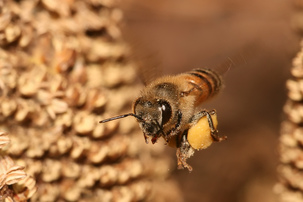 The fear of the Lord is clean, enduring forever; the ordinances of the Lord are true, they are righteous altogether; more to be desired are they than gold, yea, than much fine gold; sweeter also than honey and the honeycomb. Psalm 19:10-11 In the Bible, “honey” is generally assumed to be date honey, or silan, a boiled-down date and water mash. Beekeeping is not referred to in the Bible, nor, until recently, was there any evidence found of beehives at archaeological sites in ancient Israel. In 2005 at Tel Rehov in the Beth Shean Valley in northern Israel, archaeologist Amihai Mazar of the Hebrew University of Jerusalem, and his team made an extraordinary discovery: eight cylindrical beehives, which were confirmed by evidence of beeswax molecules in their unfired clay walls. In 2007, a large complex of additional hives were excavated on the site and dated to the mid-10th to early 9th century BCE. The beehives made of straw and unbaked clay, were found in orderly rows of 100, and are evidence of an advanced honey-producing beekeeping industry 3000 years ago. This apiary would have held more than one million bees, in the midst of what was a crowded city. As in other traditional beekeeping societies, people presumably learned to live alongside the bees, considering the precious commodity they produced. Mazar notes, ”This discovery has shed light on a hitherto unknown branch of the ancient economy, and we are fortunate that we can place the find within its context in the society, culture, and economy of ancient Israel.” As the warmth of the sun returns to the Biblical Garden, and the shoshanim -- narcissus, hyacinths, poppies -- prepare for their late spring display, a sleepy honeybee finds a warm spot of early morning sun and considers all of the busyness ahead in a new season of abundant budding and blossoming. She has fed all the cold winter on last year’s honey and when temperatures reach about 65 degrees she will begin again to collect nectar and pollen to feed her queen and raise a new generation. She is one of God’s small miracles, who live alongside us in the Biblical Garden. |
AuthorsMichael Schlesinger is Temple Sinai’s Biblical Gardener. Mike has been gardening since he was eight years old. He used to grow grape vines and make wine when he lived in California. He now tends to our garden, continuing the traditions started by Catherine Walters. Archives
March 2020
|

Affiliated with the Union for Reform Judaism
30 Hagen Avenue • Cranston, RI 02920 • 401-942-8350 Office: dottie@templesinairi.org Rabbi Jeffrey Goldwasser: [email protected] |
Want to sign up for the weekly Sinai Scroll email?
Click here to receive weekly updates on Temple services, events and a message from the Rabbi. |


